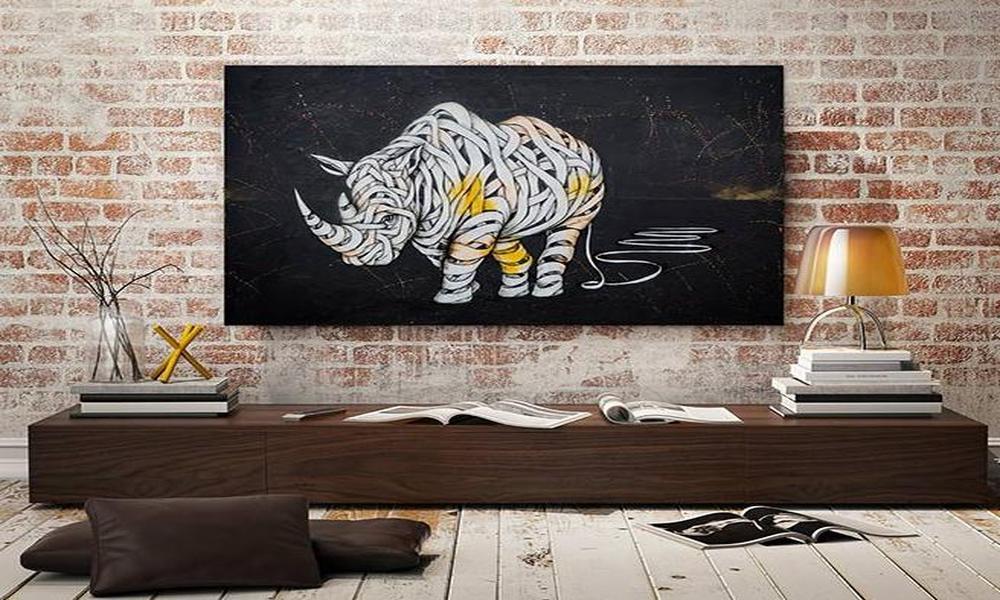Industrial wall painting is a unique and creative way to transform the look and feel of your space. This design trend, often associated with urban lofts and converted warehouses, celebrates the raw beauty of exposed materials and unfinished surfaces. Whether you’re looking to spruce up your home, office, or commercial space, wall painting can add character, depth, and visual interest to your environment. In this blog post, we’ll explore various tips and inspirations to help you unleash your creativity and create a stunning wall painting project.
Industrial Wall Painting Techniques
You can use various techniques to achieve an industrial look on your walls. Here are some popular options to consider:
Exposed Brick
The exposed brick wall is one of the most iconic elements of industrial design. If you’re lucky enough to have original brick walls in your space, you can simply clean and seal them to showcase their natural beauty. However, if you don’t have brick walls, you can still achieve this look using wall painting techniques. For instance, you can use a brick stencil and paint to create a realistic brick pattern on your walls. Alternatively, you can use faux brick panels or wallpaper to mimic the appearance of exposed brick.
Concrete Finish
Another common feature in industrial spaces is the use of concrete. To create a concrete wall effect, you can use a combination of paint and plaster to achieve a textured, uneven surface. Start by applying a base coat of grey paint, then add layers of plaster mixed with water and paint to create texture. Use a trowel or spatula to spread the mixture onto the wall, creating an irregular pattern that resembles concrete. Finish by applying a sealant to protect the surface and give it a polished look.
Distressed Metal
Metal is another key element in industrial design, and incorporating a distressed metal finish on your walls can add an edgy, urban vibe to your space. To achieve this look, start by applying metallic paint in your desired colour (such as bronze, copper, or silver) as a base coat. Next, use a sponge or rag to dab on a darker shade of paint, focusing on the edges and corners to create a worn, aged appearance. Finish by applying a clear glaze or sealant to protect the surface and add a subtle sheen.
Weathered Wood
Reclaimed wood is often used in industrial spaces for its rustic charm and character. You can use a faux wood painting technique to recreate this look on your walls. Begin by applying a base coat of paint in a colour that mimics the wood’s natural grain, such as a warm brown or grey. Then, use a wood-graining tool to create the appearance of wood grain by dragging it through the wet paint. Experiment with various colours and techniques to achieve the desired level of weathering and distress.
Bold Accent Walls
While neutral colours are a staple in industrial design, incorporating bold accent walls can add a dynamic touch to your space. Choose a vibrant, contrasting colour that complements your existing palette, and use it to create a focal point in your room. This can be done through a solid colour accent wall, geometric patterns, or even large-scale murals that showcase your artistic flair.
Tips for a Successful Industrial Wall Painting Project
To ensure your wall painting project is a success, keep these tips in mind:
- Preparation: Properly prepare your walls by cleaning and repairing any damage before starting your project. This will ensure a smooth, even surface for your paint to adhere to.
- Quality Materials: Invest in high-quality paints, tools, and supplies for the best results. This will make your project easier and ensure a long-lasting, professional-looking finish.
- Test Colors: Before committing to a specific paint colour or technique, test it on a small section of your wall to ensure it achieves the desired effect.
- Patience and Practice: Wall painting techniques can require some skill and practice, so don’t be afraid to experiment and learn as you go. Remember, part of the charm of industrial design is its imperfect, lived-in appearance.
Bottomline:
Industrial wall painting is an exciting and creative way to transform your space into a unique and captivating environment. By embracing the raw aesthetic, choosing the right colour palette, incorporating texture and metal accents, showcasing artwork, and mixing styles, you can unleash your creativity and create an industrial-inspired masterpiece. So, grab your paintbrush and get ready to embark on a journey of wall painting that will truly make your space shine.
Related posts
Categories
Recent Posts
Tags
Calendar
| M | T | W | T | F | S | S |
|---|---|---|---|---|---|---|
| 1 | ||||||
| 2 | 3 | 4 | 5 | 6 | 7 | 8 |
| 9 | 10 | 11 | 12 | 13 | 14 | 15 |
| 16 | 17 | 18 | 19 | 20 | 21 | 22 |
| 23 | 24 | 25 | 26 | 27 | 28 | 29 |
| 30 | ||||||

